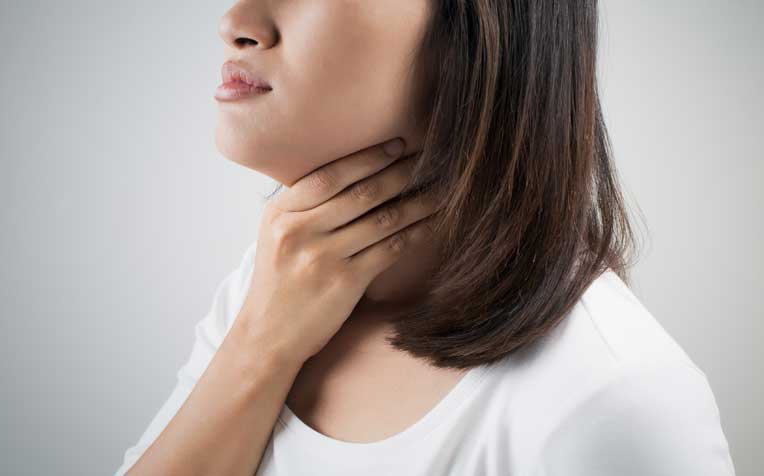
Symptoms of head and neck cancer include a persistent lump in the head or neck.
Head and neck cancer symptoms are painless in the early stages
“With at least 800 new cases every year, it is one of the most common cancers in Singapore,” observes Dr Tan Hiang Khoon, Senior Consultant, Department of Surgical Oncology, National Cancer Centre Singapore (NCCS), a member of the SingHealth group. Worldwide, this cancer is on the rise in young patients, possibly due to an increased incidence of human papillomavirus (HPV) infection-associated cancer in young females and the increased incidence of thyroid carcinoma.
“Usually, the patient would complain of seemingly harmless symptoms, like an enlarged lymph node on the neck, an ulcer in the mouth, a sore throat or a hoarse voice,” says Dr Tan. “But if it is head and neck cancer, these symptoms will not heal or go away with time. There is also a common misconception that cancer must cause pain. The truth is that early stage cancers are often painless!”
Head and neck cancer symptoms may include:
- A raised growth, swelling or lump in the neck
- Red or dark spots, redness with white or rough patches in the mouth
- Bleeding from the nose or mouth
- A sore that does not heal
- Persistent sore throat or hoarseness
- Burning or numbness in the tongue, lip or mouth
- Painful, sensitive or loose teeth
- Difficulty in chewing, swallowing or talking
Dr Tan says recognising the symptoms of head and neck cancer early can greatly improve cure rates. So play it safe: If you notice warning signs, seek treatment immediately.
Head and neck cancer risk factors
Generally, those who are male and over the age of 40 are more likely to contract head and neck cancer.
But certain lifestyle habits and environmental factors can also play a part in some head and neck cancers involving the mucosa of the mouth and the throat.
“The major risk factors of oral and throat cancer are the use of tobacco, chewing betel nut leaves, oral sex with multiple partners, and frequent, heavy consumption of alcohol,” says Dr Tan. “Combining alcohol and tobacco further increases the risk.”
Other factors that raise a person’s risk of head and neck cancer are:
- Poor oral health and hygiene, including dental caries and ill-fitting dentures
- Exposure to the Epstein-Barr virus (EBV), a herpes virus
- Human papillomavirus (HPV) infection, usually transmitted during sexual activity, in particular oral sex
- Exposure to wood, metal dust, asbestos, paint fumes and other chemical inhalant
- Exposure to radiation
- Excessive sun exposure, in the case of skin cancers
- Genetic factors, especially for thyroid carcinomas
“To help prevent head and neck cancer, avoid smoking or drinking excessively,” advises Dr Tan. “Load up on fruits and vegetables, as well as iron, vitamins A and B. Practising good dental habits – like brushing twice a day and flossing – can also help keep this cancer at bay.”
Ref: T12
Contributed by


















 Get it on Google Play
Get it on Google Play